|
Revenge is one of those fundamental human emotions. As artist Paul Gauguin put it, "Life being what it is, one dreams of revenge." But there's definitely a difference between the revenge fantasies of men and women. Men don't ponder revenge in the same way that women do. For example, guys will often destroy another's property when it comes to revenge. Did Lorena Bobbitt consider keying her husband's car? Probably not. Men might actually think that "living well is the best revenge." For women, revenge is the best revenge. Nathaniel Hawthorne wondered whether "hatred and love be not the same thing at bottom. Each ... supposed a high degree of intimacy and heart-knowledge ... Each leaves the passionate love or the no-less-passionate hater, forlorn and desolate by the withdrawal of his object." Revenge and obsession sleep in the same twin bed, and that's probably why revenge is so often associated with a betrayal of the heart. A love that's river deep and mountain high is going to produce a grief just as deep and high when it's taken away. From the Persuaders to the Pretenders to Annie Lenox, the song remains the same: It's a Thin Line Between Love and Hate. And watch out for the steak knife and the frying pan, dude!
0 Comments
Before there was Lisbeth Salander, pierced and tatted Goth-punk princess of ass-kicking revenge (The Girl with the Dragon Tattoo who kicked the hornet's nest while playing with fire), there was Tamora, the Queen of the Goths (literally) and Empress of Rome (by marriage), and the absolute rani of revenge in Shakespeare's bloodiest tragedy (we are talking buckets!), Titus Andronicus.  Jessica Lange as Tamora in Julie Taymor's Titus (love the hair!) Tamora, a prisoner of the Roman Army is forced to beg for her life and the life of her oldest son. When Titus, the Roman general, puts him to death anyway, Tamora vows that she will make Titus’ life miserable until her (and his) dying days. And then she proceeds to fulfill that vow. Tam-tam catches a break when she catches the eye of Saturninus, the new emperor (she’s one of those hottie cougars) and she agrees to please in change for power. Of course, Tamora is really into Aaron, a Moor, who is basically up to no good 24-7. I believe the word is amoral. Or is it immoral? Anyhow, they (Aaron and Tamora) are into plotting evil. There’s also some racism on the Romans’ side when Tamora delivers her mixed-race baby. So, given the circumstances, Tamora might be forgiven her desire for madness and mayhem.  Anthony Hopkins as Titus Hannibal Lecter Andronicus (also auditioning for Avatar) However, she goes a bridge too far when she turns a blind eye and allows her sons to ravage Lavinia, the virtuous daughter of Titus. Lavinia is the stereotypical"good girl," which during Shakespeare’s era meant she was chaste, obedient, and silent (after being ravaged, her silence is permanent, because the boys cut out her tongue--I told you this was bloody). Plucky Lavinia takes up a stick with her teeth and writes the names of Tamora’s sons in the dirt. Titus, of course, vows to get his own revenge. He tricks the lads into hanging out with him, slits their throats and uses them as the main ingredients of pie that he serves up at a banquet.  Manchilds in a tender, flaky crust... You guessed it: Tamora is one of the honored guests. (ShadesofHannibalLecter!!! I’m guessing he served it with a “nice Chianti.”) Titus, totally schizo at this point, kills his own daughter, so that the “shame” of her defilement may die with her. He reveals the secret ingredient of his pie and stabs Tamora, killing her. The whole scene turns into a blood-soaked Rube Goldberg machine: Saturninus stabs Titus, so then Lucius, the last remaining son of Titus, stabs Saturninus, (and they kill two enemies, and they kill two enemies, and so on and so forth... you get the picture) until the stage is littered with bodies. Just goes to show you, as Wolowicz and Koothrappali discovered in "The Gothowitz Deviation" episode of Big Bang Theory: don't mess around with Goth chicks, whether you have tattoo sleeves or not! Put this in your pipe and smoke it (not literally!) Your husband goes off to fight in Troy, but before he leaves, he sacrifices your daughter, Iphigenia, to the goddess Artemis, in hopes that she'll blow some favorable winds his way. Oh please! Then, he's gone ten years -- which might be a good thing, because any normal mother is going to want to lay waste to the man who killed her child. Right? So who could fault you for getting together with another man and plotting some revenge? And to add insult to injury, when your hubby finally does come home from the battlefield, he's dragging a little Trojan hussy behind him (Cassandra -- yeah, that one, who went around proclaiming future gloom and doom). Such is the life of long-suffering Clytemnestra, in the Greek tragedy Agamemnon by Aeschylus (why not call it Clytemnestra?) Okay, so she's a liar, a two-timer and a murderess. He had it coming. 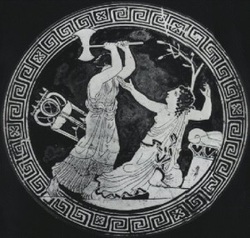 Clytemnestra takes the ax to Cassandra. Of course, in the end, she winds up getting the sharp end of the ax herself, in Sophocles' Electra, when the surviving brother and sister of Iphigenia team up to off Mom and their new stepfather to revenge their father's death. Poor Iphigenia, she's kind of forgotten in all the blood-letting. Oh, wait, she does eventually get a couple of plays of her own, by Euripides (all the Greek playwrights were quite the rivals, determined to outdo each other)! In one play she dies, in the other she is spirited away to become a priestess of the goddess Artemis. Either way, she was the first person to have her life totally screwed up because of the Trojan War. (That's right; it wasn't that air-head Helen...) 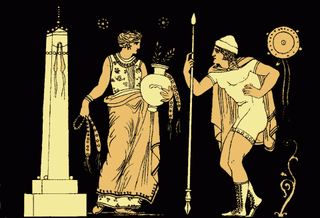 Electra and her bro, Orestes, discuss matricide (Project Gutenberg) Now, consider Electra, daughter of Clytemnestra and sister to the ill-fated Iphigenia, who was, as you recall, sacrificed by their father. She plots with brother Orestes to slay Mom and her new husband. The big moral dilemma here? Where does Electra get off thinking she can kill her mother to avenge Daddy, but that her mother was not justified in killing the old fart to revenge her daughter, Iphie? Electra's system of morality, if she has one, seems to be based upon contradiction and self-deception. (Or could it be that Freudian thing, the Electra complex -- the female equivalent of the Oedipus complex?) Or maybe she has convinced herself that she is just right, and that her mother is just wrong. (Sounds familiar to the mother of a teenager...) But, hey, she's a female bent on revenge...who says she has to make sense? Consider Glenn Close in the movie “Fatal Attraction.” As the weekend fling of babe magnet Michael Douglas, she can’t get it through her head that she is nothing more than that. Why would he possibly want to go home to Anne Archer (possibly because Anne Archer is a comely brunette who's not a psychopath, but that's beside the point). The point is Michael Douglas was a cheating horndog. So, Alex Forrest (the character): is she the villain or the heroine? “I won’t be ignored, Dan.”  Madame is going to butterfly you... with that chef's knife Those are powerful scary words to manchilds everywhere. Juvenal, who was the Rush Limbaugh of the Roman Empire, squawked that “it’s … a feeble, tiny mind that takes pleasure in revenge… no one delights more in vengeance than a woman.” (And since he wasn't worried about losing advertisers, he had the cojones to not apologize afterwords, as if.) It is not known how he died, but it is reasonable to suspect that it may have involved at least one shiv wielded by a member of the opposite sex in a particularly tender, vulnerable part of the body. Much later, Nietzsche echoed Kipling when he wrote “In revenge and love, the woman is more barbarous than man.”  Salome (with the head of John the Baptist) by Titian So, is it true? Are women more prone to take up the steak knife or throw gasoline and a match to the bed? We look again to literature, film and music to ponder this timeless question. Let’s take a look at Salome, shall we? Dutiful daughter? Seductress? Candidate for Dancing With the Stars? Depends on the version of the story that you read. In the Biblical tale, Salome was the daughter of Herodias and stepdaughter of Herod Antipas, ruler of Galilee in Palestine. John the Baptist denounced the marriage of Herodias and Herod, because they were in-laws: Herodias had been previously married to Herod’s half brother Philip. (Ooops!) Herod imprisoned John for his blunt speech, but was too much of a wuss to put the renowned prophet to death. Herodias, however, had the cojones in the family and pressed her daughter Salome to "seduce" her stepfather Herod with a dance, in exchange for whatever she wished. At her mother's urging, Salome thus asked for the head of John the Baptist-- on a platter, no less. The entranced Herod did her bidding, and Salome delivered the plate, head and all, to mama.  Salome 2.0: the Rita Hayworth version Oscar Wilde wrote a shocking version of the story as a play, which later inspired Richard Strauss to translate it into an opera. In these versions, Herod's lust for Salome is manifest and Salome uses his weakness to gain the upper hand by twirling through the infamous "Dance of the Seven Veils." She, in turn, has the hots for John the Baptist, which is not a feature of the original plot. John, being a budding saint, of course rejects her advances and the only way Salome can have any part of him is by literally demanding his head. Salome fulfills her desires by kissing the cold, dead lips of John's decapitated head. And so she had morphed from dutiful daughter to murderess, one of the first of many femme fatales, and perhaps the origin of the idiom“I lost my head.” Losing one's head is definitely fatal; losing one's hair not so much -- unless you are Samson and you fall under the spell of the temptress Delilah, who sells you out for a few pieces of silver (this seems to be a recurring theme in the Bible). Samson did survive, eventually recovered his manhood with his hair, after begging God's forgiveness for various sins, including his infatuation with Delilah, and used his renewed strength to bring down the temple of Dagon, killing many Philistines. As well as himself. (Ooops.)
From Salome and Delilah, it’s not a long leap to Hollywood’s Evelyn Draper, Clint Eastwood’s psychotic one-night stand in Play Misty for Me, or Catherine Tramell, another one of Michael Douglas’s crazy chicks in Basic Instinct, or the real-life Lorena Bobbitt, who captured the public’s imagination (in one way or another) in 1993, when she took a knife to a precious part of her abusive husband’s anatomy. Or to paraphrase Doralee Rhodes (Dolly Parton’s character in Nine to Five), turned him from a rooster to a hen in one slice. The other day a student inquired about the meaning and origin of the phrase "deadlier than the male." First off, I noted that the original expression is "more deadly than the male," and that the author of the quote is one of my favorites, Rudyard Kipling. And, librarian that I am, I proceeded to note that good old Rudyard lived from 1865 to 1936 and spent a good portion of his childhood and young adult years in India, parts of which are now Pakistan, including Lahore, where he did some of his earliest writing. The lad looked at me quizzically: "You mean they sent bombs in the mail back then? Until someone came up with one that was even worse than the mail?" After I picked myself up off the floor, I recited the entire quote to the little fellow: "The female of the species is more deadly than the male." But then I was a bit flummoxed as to how to explain what Kipling had in mind. So I turned to the example of black widow and other spiders, praying mantises and scorpions and how fierce female animals can be in protecting their young -- ah, the savagery of Nature -- and, of course, steered him with a book for further information on the specifics. I have yet to hear from angry parents that I provided the dreaded TMI, so I assume all is copacetic. 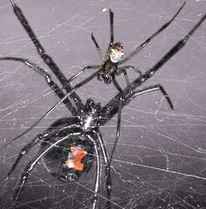 courtesy of spiders.org Then, of course, I got to thinking about Kipling's real meaning and the whole issue of female revenge and how literature and film are just rampant with women who serve it up hot or cold. The queen of women scorned, Medea, boasted: "A woman's weak and timid in most matters; the noise of war, the look of steel make her a coward. But touch her right in marriage, and there's no bloodier spirit." And we all know how she exacted her revenge on Jason's desertion. Then there is Judith, heroine and namesake of one of the apocryphal books of the Bible. The Assyrian general Holofernes laid siege to the city of Bethulia, and soon the residents began to see no hope but surrender. Judith, a rich and beautiful widow (and clever to boot), devised a plan. Entering the army camp outside the city, she pretended to provide the general with information about the weakest point of entry. He was quite taken by her charm; invited her to feast with him before the assault of the city; overindulged in cheap wine and subsequently passed out in his tent, alone with the widow. Judith prayed for strength, took up the general's own sword, and struck his head clean off. She stuck it in a sack, toted it back to Bethulia, revealed her grotesque trophy and instructed the men to mount an attack on the Assyrians. When the now-beseiged beseigers tried to rouse their leader, they were aghast to find him headless, and speedily decamped back to Assyria. The Israelites seized the plunder that the fleeing soldiers left behind and gave the spoiliest of the spoils to Judith, now their blessed Lady of Decapitation. Or as Cary Grant never actually said, "Judy, Judy, Judy!" |
AuthorTo find out more about me, click on the Not Your Average Jo tab. Archives
February 2024
Categories
All
|

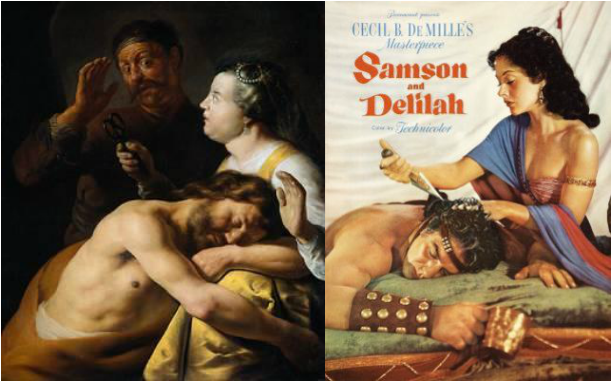

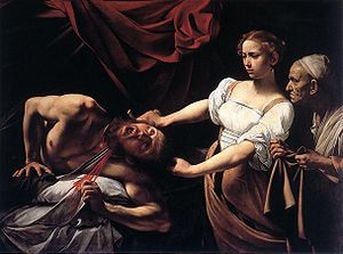
 RSS Feed
RSS Feed